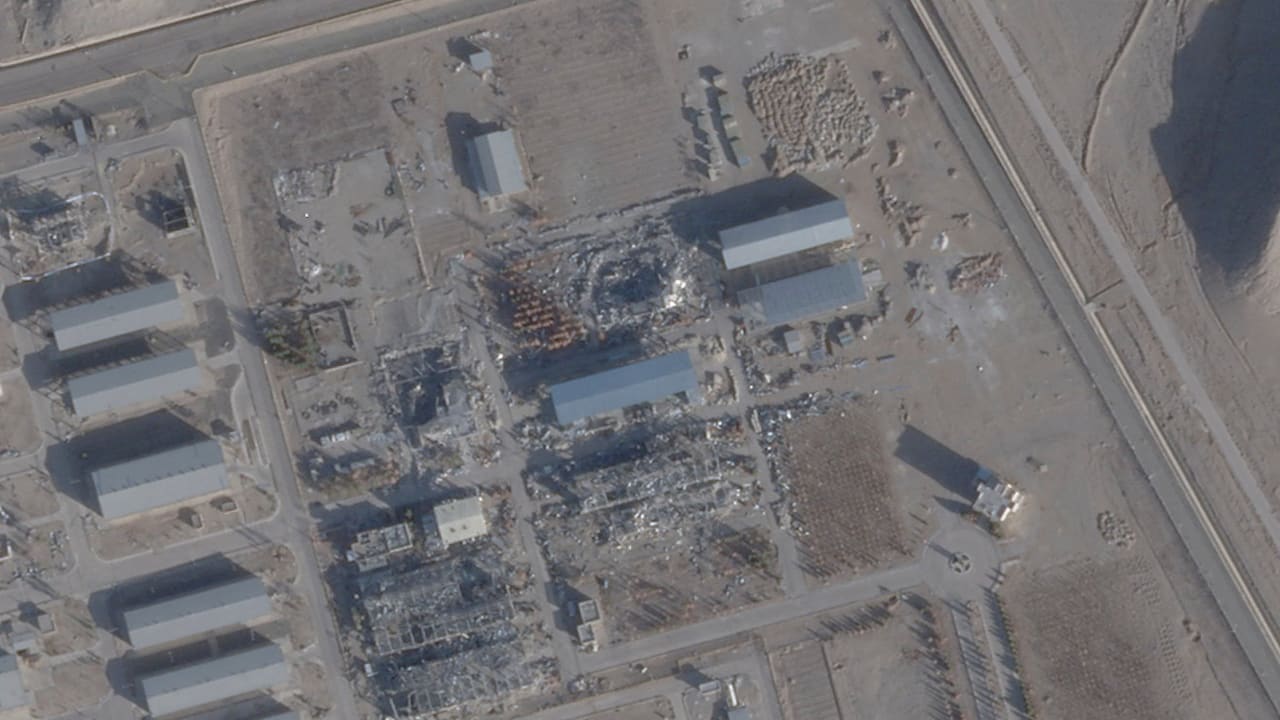Top News
-
February 15, 2026
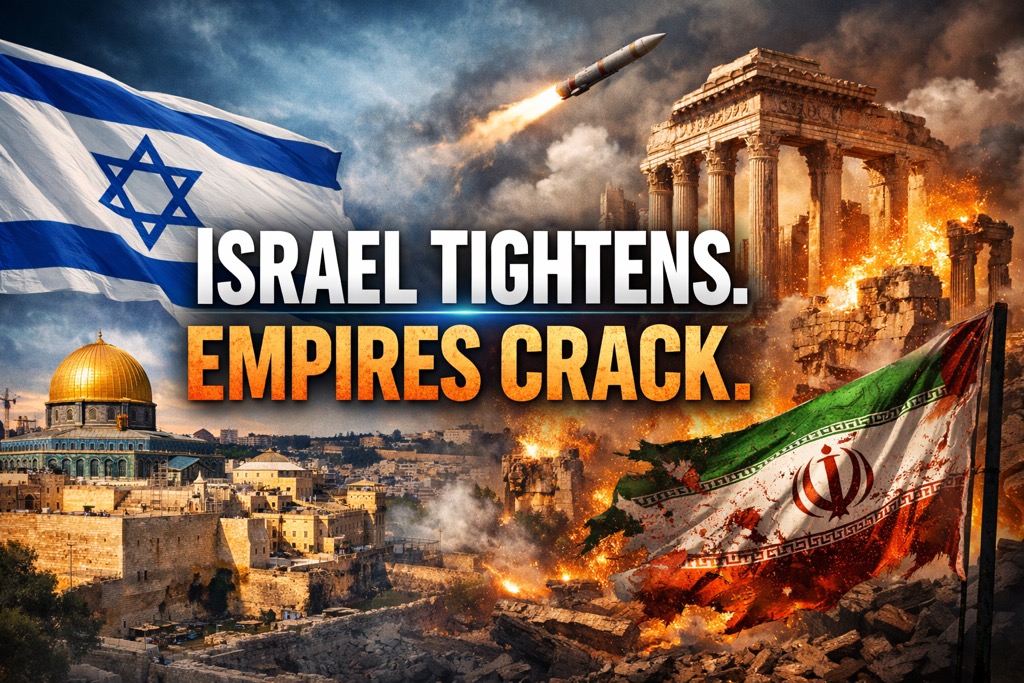
-
February 15, 2026
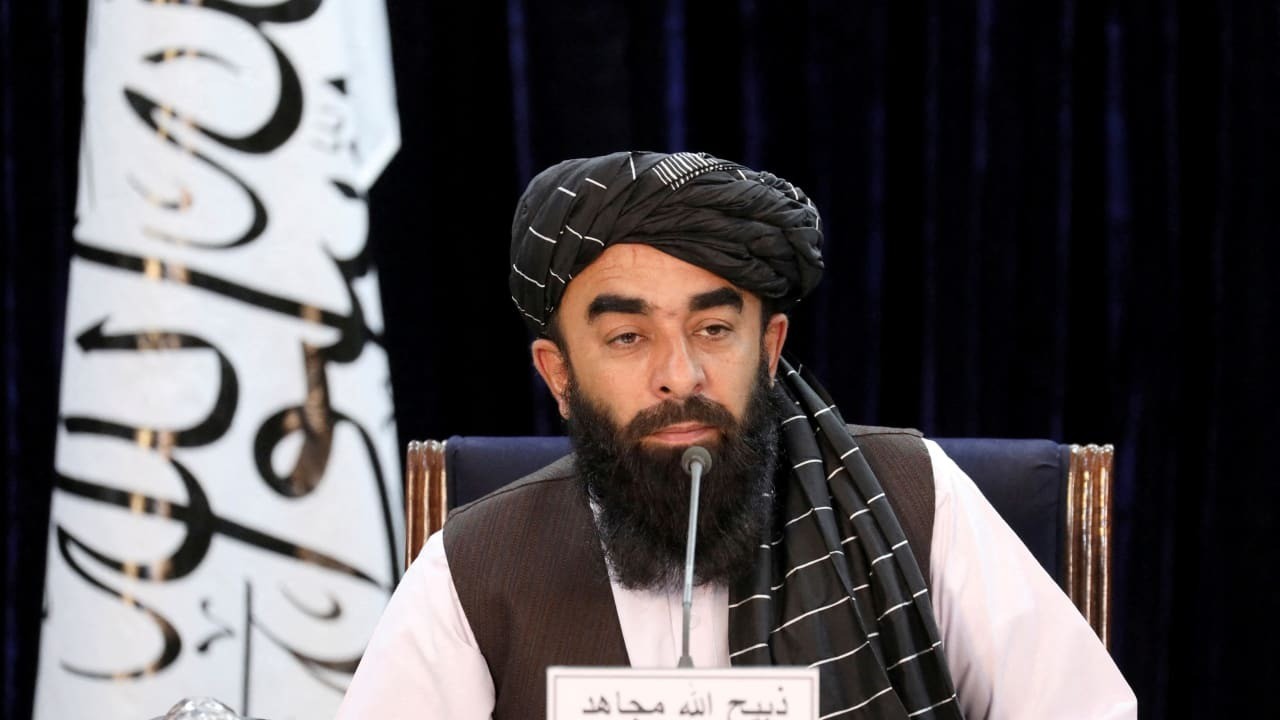 Taliban spokesman Zabihullah Mujahid speaks during a news conference in Kabul, Afghanistan November 10, 2021. (photo credit: REUTERS/Ali Khara/File Photo)
Taliban spokesman Zabihullah Mujahid speaks during a news conference in Kabul, Afghanistan November 10, 2021. (photo credit: REUTERS/Ali Khara/File Photo)The Taliban will aid and assist the Islamic Republic of Iran in the event of US strikes on the country, the group's spokesperson Zabihullah Mujahid told Radio Iran's Pashto-language service on Sunday.
Afghanistan's people would show sympathy and possibly cooperate with Iran if requested, Mujahid clarified, noting that this would not automatically pull the Sunni group into joining a retaliatory war against the US.
Additionally, the Taliban's message is that they do not want conflict between the US and Iran, and would prefer to pursue diplomatic measures and continued negotiations over Iran's nuclear program. -
February 15, 2026
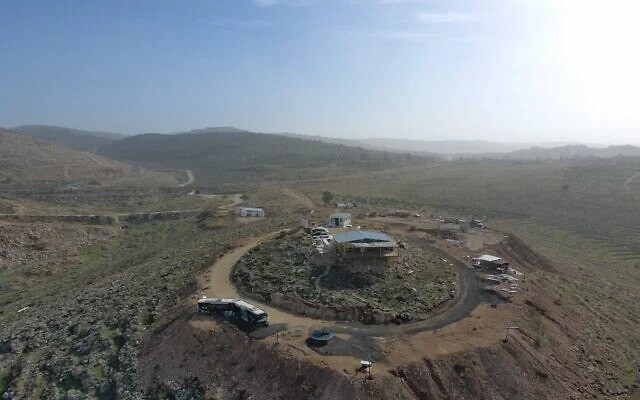 The settlement farming outpost of Hesed Olam in the central West Bank where a 'conference of appreciation' for illegal farming outposts was held by the Mateh Binyamin Regional Council, February 2, 2026. (Courtesy, Arutz 7)
The settlement farming outpost of Hesed Olam in the central West Bank where a 'conference of appreciation' for illegal farming outposts was held by the Mateh Binyamin Regional Council, February 2, 2026. (Courtesy, Arutz 7)The cabinet authorized on Sunday the opening of a land registration process in the West Bank for the first time since 1967, with the ministers who initiated the measure saying it would enable the registration of broad swaths of land as state land available for Israeli development.
The resolution authorized an initial budget of NIS 244 million ($79 million) for the land registration process in the years 2026 to 2030 in Area C of the West Bank, where Israel has full military and civilian control, and the establishment of 35 positions in various ministries and state agencies to conduct the registration work.
The explanatory text of the resolution noted, however, that the registration process will be lengthy and take at least a year and a half for every plot of land, if not more, and that registering all non-registered land in Area C could take up to 30 years.
-
February 15, 2026
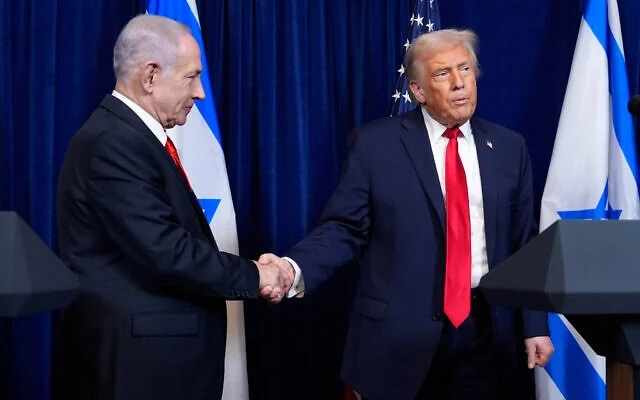 US President Donald Trump (R) shakes hands with Prime Minister Benjamin Netanyahu as Trump listens to a question from a reporter at the end of a news conference at Mar-a-Lago, on December 29, 2025, in Palm Beach, Florida. (photo: Alex Brandon, AP)
US President Donald Trump (R) shakes hands with Prime Minister Benjamin Netanyahu as Trump listens to a question from a reporter at the end of a news conference at Mar-a-Lago, on December 29, 2025, in Palm Beach, Florida. (photo: Alex Brandon, AP)US President Donald Trump told Prime Minister Netanyahu in December that he would support Israeli strikes on Iran’s ballistic missile program if the US and Iran could not reach a deal, CBS News reported on Sunday, citing two sources familiar with the matter.
The US outlet reported that discussions about such an attack, roughly eight months after the 12-day Israel-Iran war in June, are ongoing. During last year’s war, the US joined the Israeli strikes on Iranian nuclear facilities. This time, the American role in an Israeli attack would involve helping jets refuel in midair or aiding Israel in receiving permission to fly over neighboring countries, CBS reported.
Several countries have said they would not let their airspace be used for an attack on Iran.
-
February 15, 2026
-
February 15, 2026
-
February 15, 2026
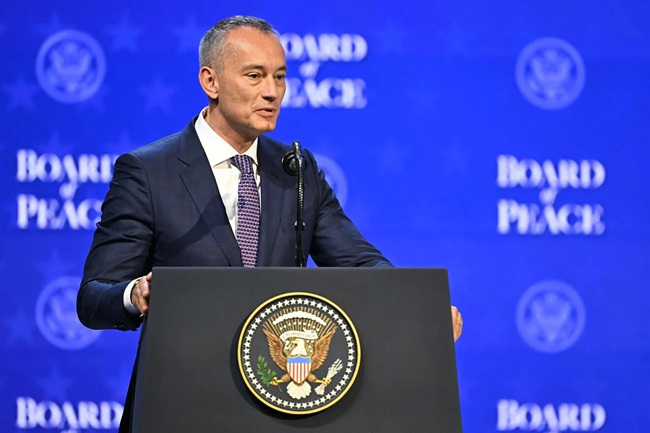 Nickolay Mladenov, the high representative for the Gaza Strip, speaks at a Board of Peace meeting on the sidelines of the World Economic Forum Annual Meeting in Davos, Jan. 22, 2026. (photo: Fabrice Coffrini, AFP via Getty Images)
Nickolay Mladenov, the high representative for the Gaza Strip, speaks at a Board of Peace meeting on the sidelines of the World Economic Forum Annual Meeting in Davos, Jan. 22, 2026. (photo: Fabrice Coffrini, AFP via Getty Images)The disarmament of Hamas and all other Palestinian terrorist groups is a precondition for the reconstruction of the Gaza Strip, the enclave’s high representative, Nickolay Mladenov, reiterated on Friday.
“Gaza needs to be governed by a transitional authority, as authorized by the Security Council resolution, under which it needs to take on the full civilian and security control of Gaza,” Mladenov said during a panel at the Munich Security Conference, referencing U.S. President Donald Trump’s peace plan, which has received formal backing of the United Nations.
“That includes the disarmament of all factions in Gaza, not just Hamas,” he stated. “Hamas, Islamic Jihad, others—there are plenty of them who have weapons and tunnels and production facilities inside Gaza.”
-
February 14, 2026
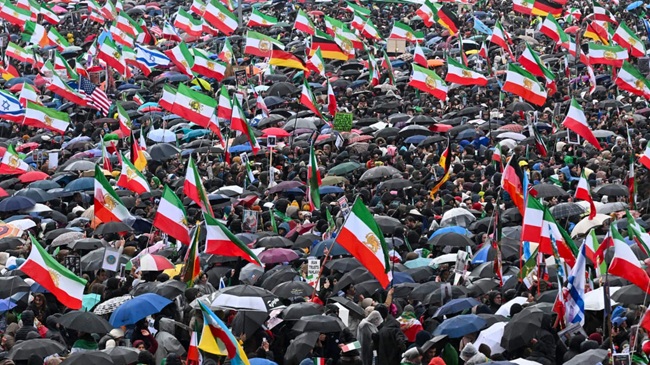 People protesting for human rights in Iran demonstrate at Theresienwiese during the 62nd Munich Security Conference on February 14, 2026 in Munich, Germany. (photo: Hannes Magerstaedt, Getty Images)
People protesting for human rights in Iran demonstrate at Theresienwiese during the 62nd Munich Security Conference on February 14, 2026 in Munich, Germany. (photo: Hannes Magerstaedt, Getty Images)Some 250,000 people demonstrated against Iran's Islamic regime in Munich's Theresienwiese on Saturday afternoon, according to local police.
The demonstration was part of a global day of action called for by Reza Pahlavi, the son of the last Shah of Persia. Pahlavi was in Germany to attend the Munich Security Conference over the weekend.
-
February 14, 2026
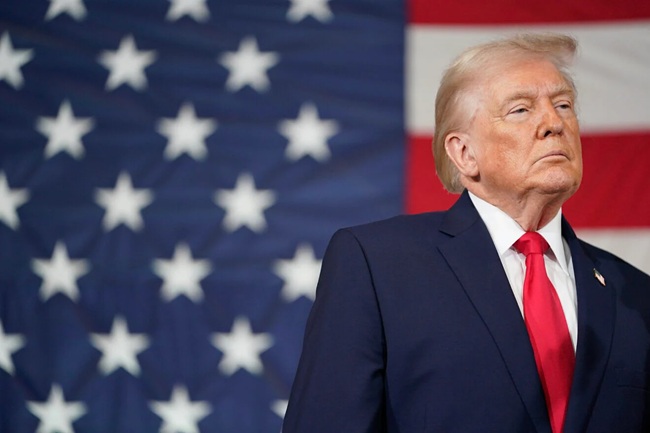 President Donald Trump speaks during a visit to the U.S. Army’s Fort Bragg base in North Carolina on Feb. 13, 2026. (photo: Nathan Howard, Getty Images)
President Donald Trump speaks during a visit to the U.S. Army’s Fort Bragg base in North Carolina on Feb. 13, 2026. (photo: Nathan Howard, Getty Images)Regime change in Iran “would be the best thing that could happen,” U.S. President Donald Trump said on Friday, a day after the Pentagon sent a second aircraft carrier group to the Middle East from Venezuela.
Trump told reporters following an event at Fort Bragg in North Carolina, “For 47 years, they’ve [the Islamic Republic] been talking and talking and talking. In the meantime, we’ve lost a lot of lives while they talk. Legs blown off, arms blown off, faces blown off. This has been going on for a long time so let’s see what happens.
“In the meantime, tremendous power has arrived. An additional power, as you know, an additional carrier is going out.
-
February 13, 2026
-
February 13, 2026

(photo: Ridge Leoni, U.S. Navy via AP)
The United States is sending the world’s largest aircraft carrier to the Middle East to back up another already there, a person familiar with the plans said Friday, putting more American firepower behind President Donald Trump’s efforts to ramp up the pressure on Iran.
The U.S.S. Gerald R. Ford’s planned deployment to the region comes after Trump suggested another round of talks with the Iranians was at hand. Those negotiations didn’t materialize as one of Tehran’s top security officials visited Oman and Qatar this week and exchanged messages with the US intermediaries.
Gulf Arab nations have warned that any attack could spiral into another regional conflict in a Middle East reeling from Israel's war against Palestinian terrorist groups in the Gaza Strip.
-
February 13, 2026
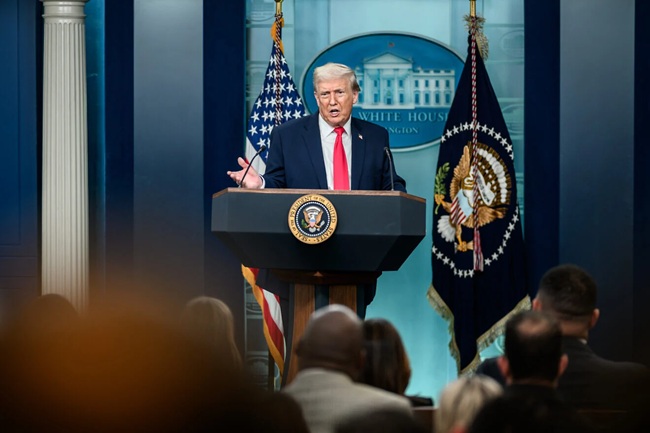 U.S. President Donald Trump addresses members of the media in the James S. Brady Press Briefing Room, Jan. 20, 2026. (photo: Daniel Torok, White House)
U.S. President Donald Trump addresses members of the media in the James S. Brady Press Briefing Room, Jan. 20, 2026. (photo: Daniel Torok, White House)U.S. President Donald Trump said on Thursday that he expects Iran to sign a deal with the United States in the next month or face “traumatic” consequences.
Speaking to reporters at the White House during an announcement about U.S. Environmental Protection Agency regulations, Trump said that his meeting with Israeli Prime Minister Benjamin Netanyhu on Wednesday was “very good” but that the United States and the Islamic Republic “have to make a deal.”
“It’s ultimately up to me,” Trump said. “If the deal isn’t a very fair deal and a very good deal with Iran, it’s going to be a very difficult time for them.”
-
February 12, 2026
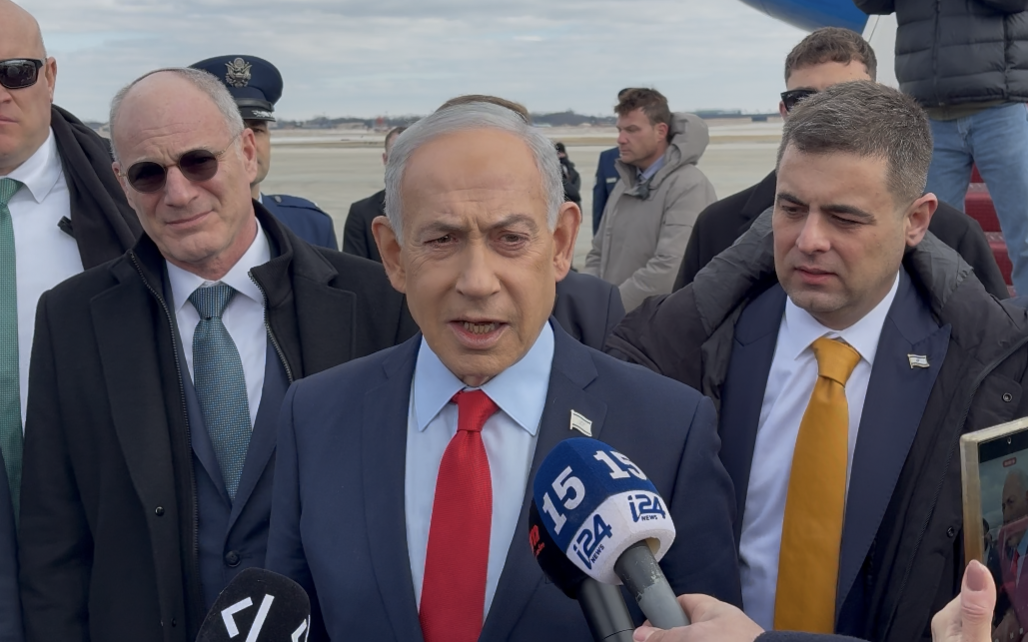
(photo: Times of Israel)
Prime Minister Benjamin Netanyahu said Thursday that US President Donald Trump believes the Iranians could be forced to accept “a good deal,” though the premier clarified that he is skeptical of the possibility.
“I have just concluded a short but important visit to Washington, during which I spoke with our great friend, President Trump,” Netanyahu said on the tarmac at Joint Base Andrews in Maryland before boarding his aircraft to fly back to Israel. “We have a close, genuine, and open relationship.”
“The president believes the Iranians already understand who they are dealing with,” he said. “[Trump] thinks the conditions he is setting, combined with their understanding that they made a mistake last time by not reaching an agreement, could lead them to accept terms that would make it possible to achieve a good deal.”
-
February 12, 2026
He stressed that any future deal would need to go beyond Iran’s nuclear program to address other key issues. “It is not only the nuclear issue,” Netanyahu said. “It is also the ballistic missiles and it is also the Iranian proxies.”
-
February 12, 2026
Turkish Foreign Minister Hakan Fidan said in an interview published Thursday in the Financial Times that the US and Iran are showing flexibility regarding a nuclear agreement. "It is a positive sign that it appears the Americans are willing to accept uranium enrichment in Iran, subject to clear limits that will be set in advance," Fidan said.
-
February 12, 2026
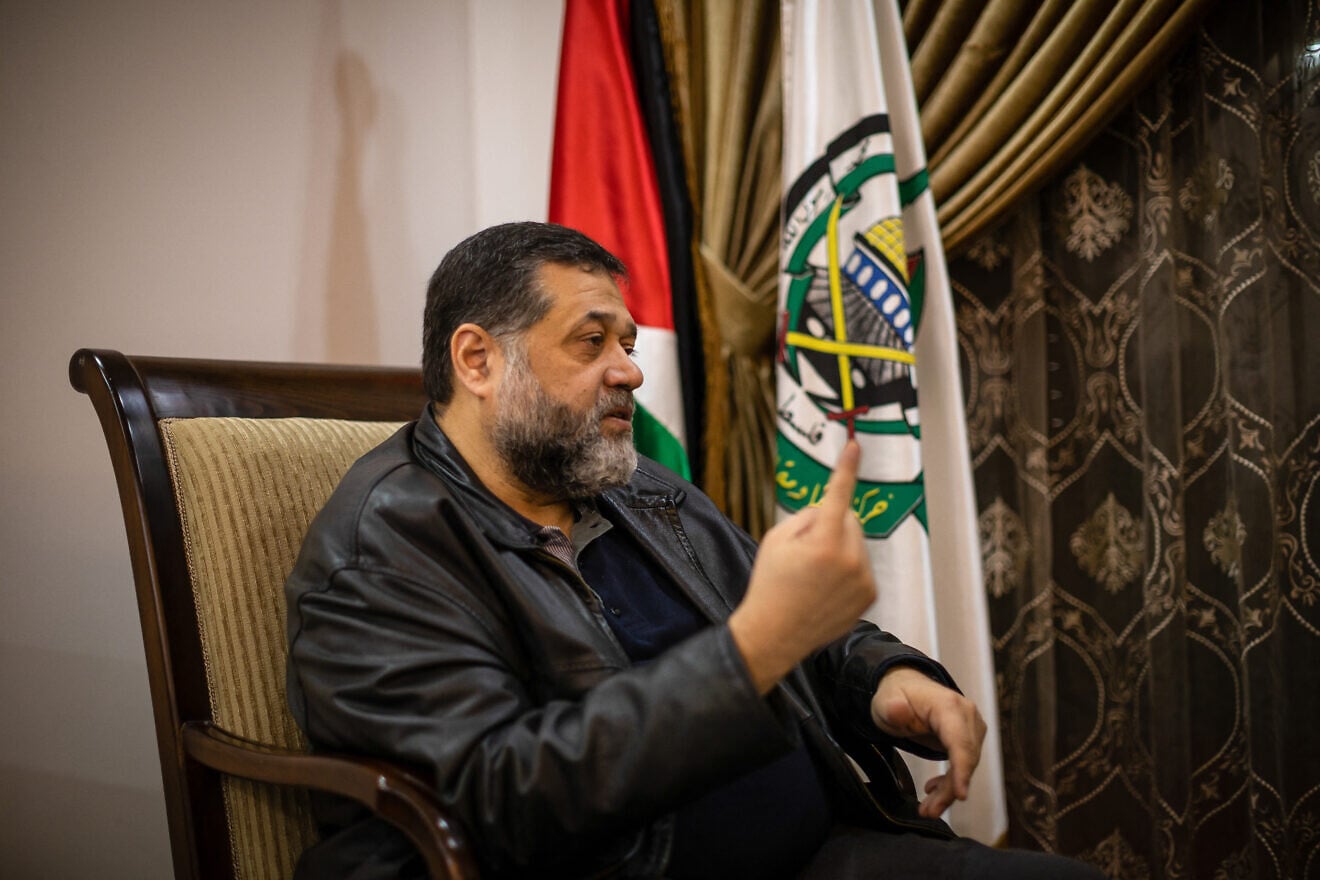
(photo: AFP via Getty Images)
Hamas will not lay down its weapons until Israel is “eliminated,” Osama Hamdan, a senior official in the terror organization, vowed on Wednesday.
“We have been very clear with mediators, and in our messages passed on to the relevant parties, that the matter of Palestinian weapons is linked to the presence or elimination of the occupation,” stated Hamdan, referencing Israel in an interview with Al Jazeera.
“To this day, the Palestinian national motto states that the occupation needs to be eliminated,” he stated. “The weapons are legal according to international law, and by virtue of the will of the Palestinian people, so these weapons will not be laid down until their goal is achieved.”
-
February 11, 2026
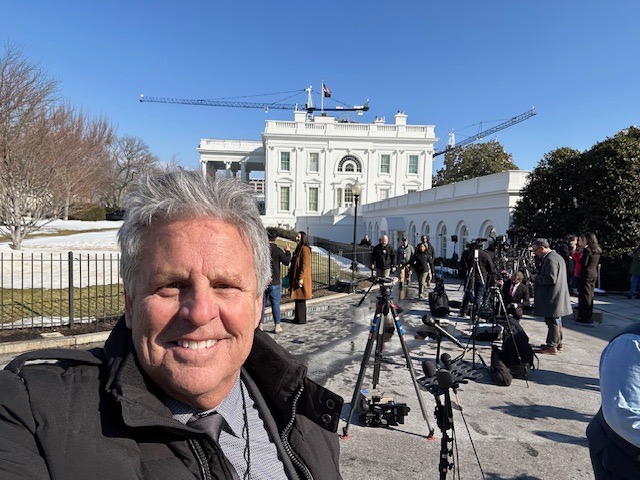
-
February 11, 2026
The nearly three-hour meeting between Prime Minister Benjamin Netanyahu and US President Donald Trump has ended, according to the Prime Minister’s Office.
Only one photo has been released to this point, and no readout from either side has been published.
-
February 11, 2026
A White House official says US Secretary of State Marco Rubio, Defense Secretary Pete Hegseth and senior adviser to the president Jared Kushner are present at the meeting between US President Trump and Prime Minister Benjamin Netanyahu.
Trump’s Special Envoy to the Middle East Steve Witkoff is also in attendance.
-
February 11, 2026
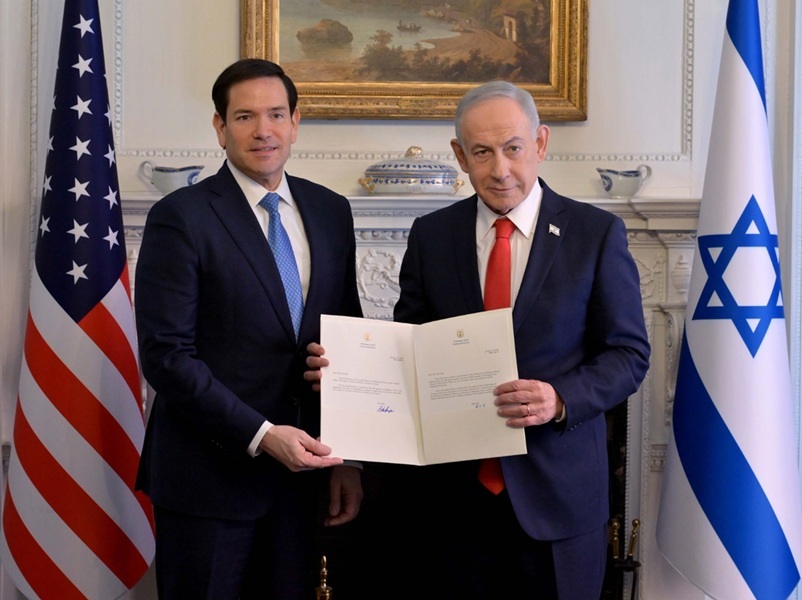 (photo: GPO)
(photo: GPO)Prime Minister Benjamin Netanyahu met, at Blair House in Washington, with US Secretary of State Marco Rubio.
Prior to his meeting with President Trump at the White House, Prime Minister Netanyahu signed up, in the presence of Secretary of State Rubio, as a member of the Board of Peace.
-
February 11, 2026
-
February 11, 2026
-
February 11, 2026
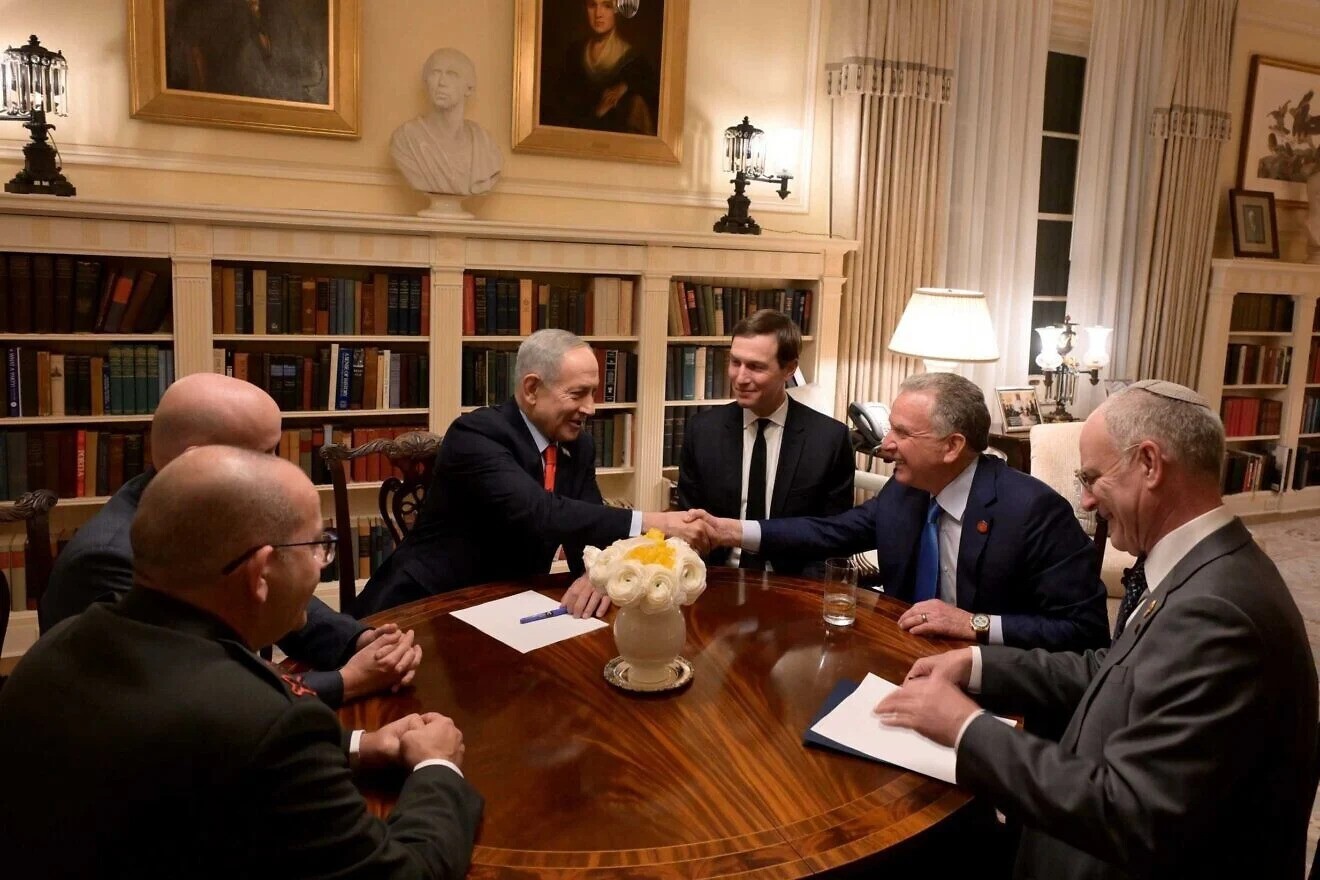 Israeli Prime Minister Benjamin Netanyahu meets U.S. Mideast envoy Steve Witkoff and Board of Peace member Jared Kushner at Blair House in Washington, D.C., Feb. 10, 2026. Photo by Avi Ohayon/GPO
Israeli Prime Minister Benjamin Netanyahu meets U.S. Mideast envoy Steve Witkoff and Board of Peace member Jared Kushner at Blair House in Washington, D.C., Feb. 10, 2026. Photo by Avi Ohayon/GPOIsraeli Prime Minister Benjamin Netanyahu met Tuesday with U.S. Middle East envoy Steve Witkoff and White House senior adviser Jared Kushner ahead of scheduled talks with President Donald Trump at the White House on Wednesday.
The meeting, held at Blair House in Washington, focused on “regional issues,” the Israeli Prime Minister’s Office said, adding that Witkoff and Kushner briefed the premier on the first round of talks with Iran.
-
February 10, 2026
On the eve of his meeting with Prime Minister Benjamin Netanyahu, US President Donald Trump said that the Israeli premier “wants a deal” with Iran, and that the current talks on Tehran’s nuclear program show promise.
-
February 10, 2026
-
February 10, 2026
-
February 10, 2026
(photo: Handout via Reuters)
The Islamic Republic is likely preparing for the possibility of a US strike, experts told The Jerusalem Post on Tuesday after reviewing high-resolution Sunday satellite images of the Isfahan nuclear complex.
Center and southern entrances to the nuclear facility have been covered with earth, and the northernmost tunnel entrance, which features additional passive defensive measures, has also been backfilled with soil, the images revealed.
“Backfilling the tunnel entrances would help dampen any potential airstrike and also make ground access in a special forces raid to seize or destroy any highly enriched uranium that may be housed inside, or the more difficult,” the Institute of Science and International Security said.
-
February 10, 2026
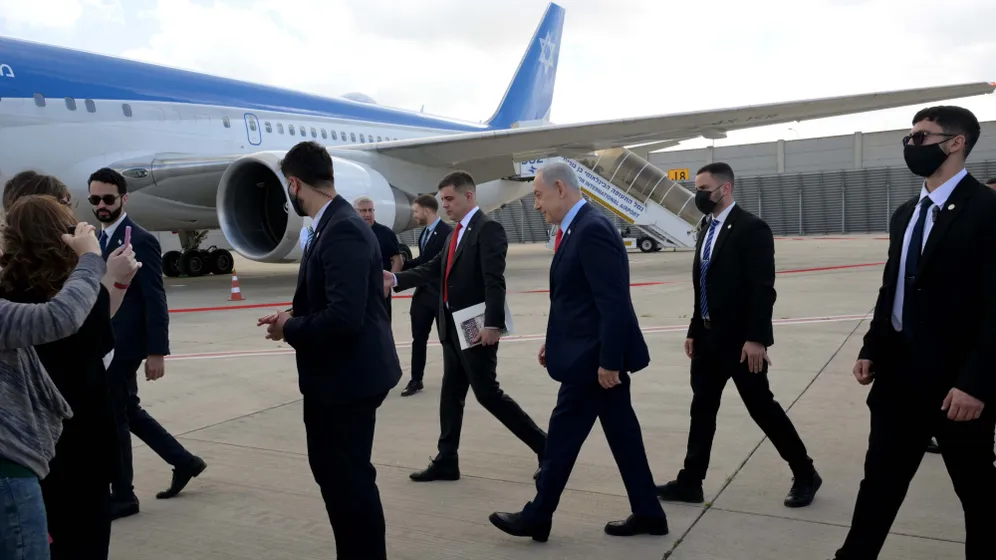 (photo: GPO)
(photo: GPO)Israeli Prime Minister Benjamin Netanyahu headed to Washington on Tuesday for his seventh visit to the United States since U.S. President Donald Trump began his second term, saying the trip will focus on Gaza, regional developments, and, above all, negotiations with Iran.
-
February 10, 2026
Israeli Prime Minister Benjamin Netanyahu is heading to Washington ahead of schedule to meet US President Donald Trump, bringing new intelligence on Iran’s ballistic missile program and regional proxy activities. Tehran has told mediators it is not ready at this stage to discuss its missile arsenal or support for proxy groups.
According to sources, Iran indicated it may be willing to discuss missiles in the future but is not prepared to compromise on ballistic missile issues now. The communication was relayed through regional mediators facilitating the ongoing US-Iran talks.
A key focus of Netanyahu’s meeting will be updated intelligence assessments pointing to a rapid and alarming acceleration in Iran’s ballistic missile program. Foreign sources estimate that Iran could soon possess around 2,000 ballistic missiles. Western intelligence officials have told i24NEWS that Tehran has significantly stepped up restoration efforts in recent months.
-
February 9, 2026
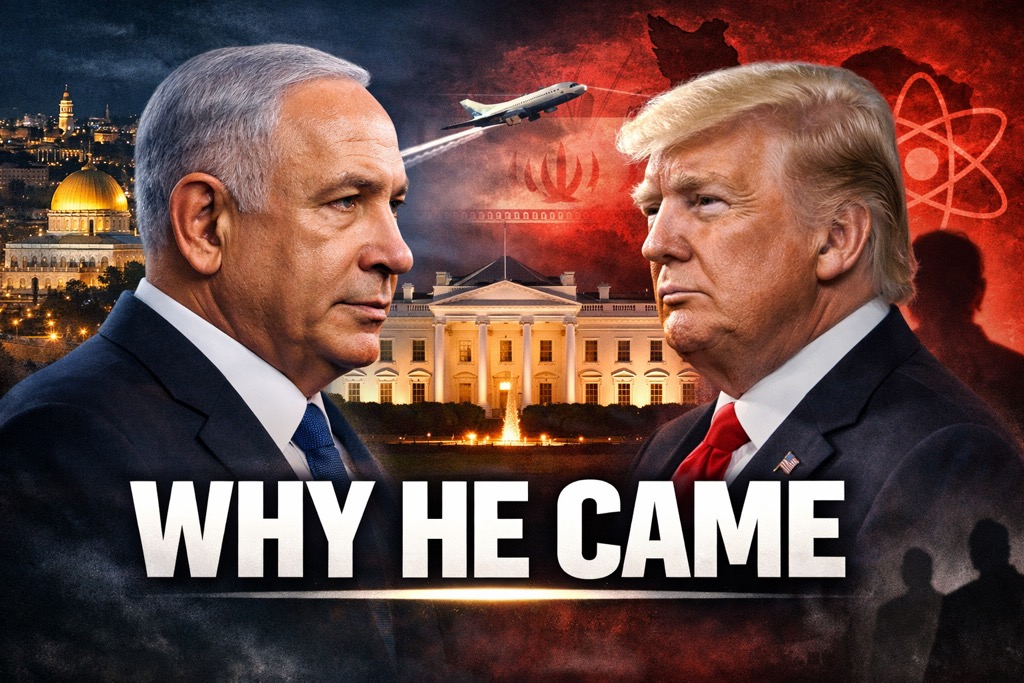
-
February 9, 2026
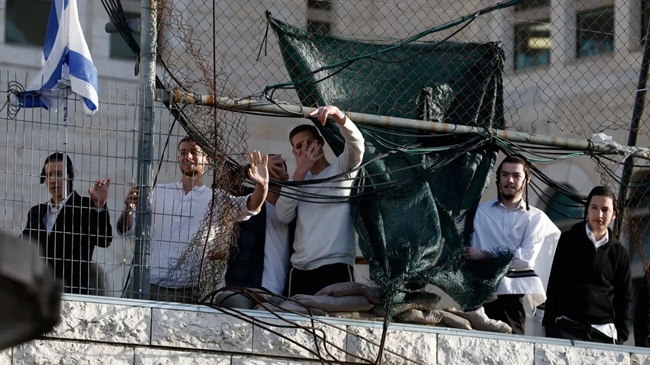 Israeli settlers gesture during a weekly settlers' tour in Hebron, in the West Bank, February 7, 2026. (photo: Mussa Qawasma, Reuters)
Israeli settlers gesture during a weekly settlers' tour in Hebron, in the West Bank, February 7, 2026. (photo: Mussa Qawasma, Reuters)Officials from the United Kingdom and the United States condemned on Monday the Security Cabinet's decision to strengthen Israel's administrative and legal control over the West Bank.
"A stable West Bank keeps Israel secure and is in line with this administration’s goal to achieve peace in the region," said a US official, who reiterated President Donald Trump's opposition towards Israel annexing the West Bank.
In October last year, preliminary approval for the plan was met with resistance from US Vice President JD Vance, who called the move a "deliberate political provocation by the opposition."
-
February 9, 2026
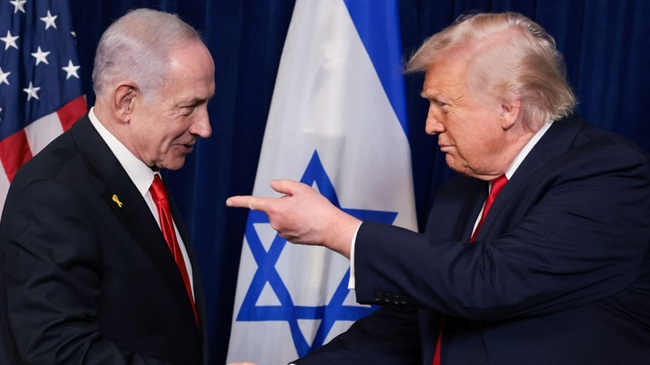 US President Donald Trump points his finger towards Israeli Prime Minister Benjamin Netanyahu as they shake hands during a press conference after meeting at Trump’s Mar-a-Lago club in Palm Beach, Florida, December 29, 2025. (photo: Jonathan Ernst, Reuters)
US President Donald Trump points his finger towards Israeli Prime Minister Benjamin Netanyahu as they shake hands during a press conference after meeting at Trump’s Mar-a-Lago club in Palm Beach, Florida, December 29, 2025. (photo: Jonathan Ernst, Reuters)Prime Minister Benjamin Netanyahu will depart on Tuesday for a short visit to the United States. He is slated to meet with US President Donald Trump and senior members of his administration on Wednesday.
Israeli officials describe the meeting as a “strategy-shaping session,” meaning that it will focus not only on the US-Iran negotiations themselves but also on what could happen if the talks were to fail, including discussions of a potential US military strike.
Accompanying the prime minister will be his military secretary, Maj.-Gen. Roman Gofman, and acting director of the National Security Council (NSC) Gil Reich.
-
February 9, 2026
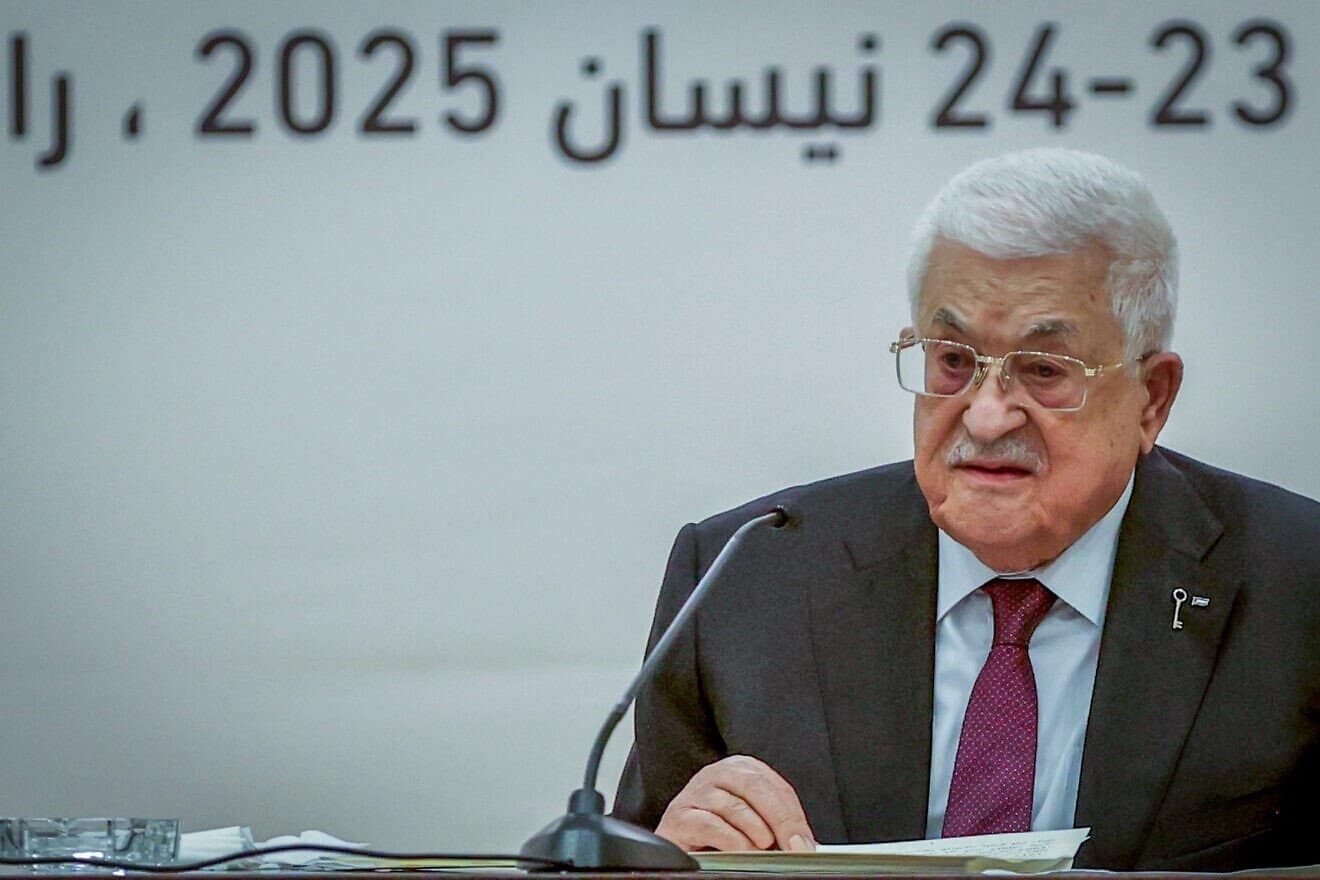 Palestinian Authority leader Mahmoud Abbas at the opening session of the Palestinian Central Council in Ramallah on April 23, 2025. Photo by Flash90.
Palestinian Authority leader Mahmoud Abbas at the opening session of the Palestinian Central Council in Ramallah on April 23, 2025. Photo by Flash90.The Palestinian Authority has been engaged in a years-long deception, pretending to halt its pay-for-slay program by various means in order to hoodwink international donors, according to a report released by a Jerusalem-based watchdog group on Sunday.
The Palestinian Media Watch report found that the P.A.’s “Martyr’s Fund,” the program which provides monthly stipends for those imprisoned in Israel for attacks against Israelis, is still going strong.
The Palestinian Authority announced last year that it had stopped pay-for-slay, Itamar Marcus, founder and director of Palestinian Media Watch, told JNS, explaining the reason PMW released the report.
-
February 9, 2026
Ali Larijani, secretary of Iran's Supreme National Security Council, is due to arrive in Oman on Tuesday, where US-Iran talks were held last Friday on a possible agreement aimed at preventing a military confrontation. At the same time, Supreme Leader Ali Khamenei released a recorded message calling on citizens to take part in marches marking the 47th anniversary of the Islamic Revolution.
-
February 9, 2026
-
February 8, 2026

-
February 8, 2026
-
February 8, 2026
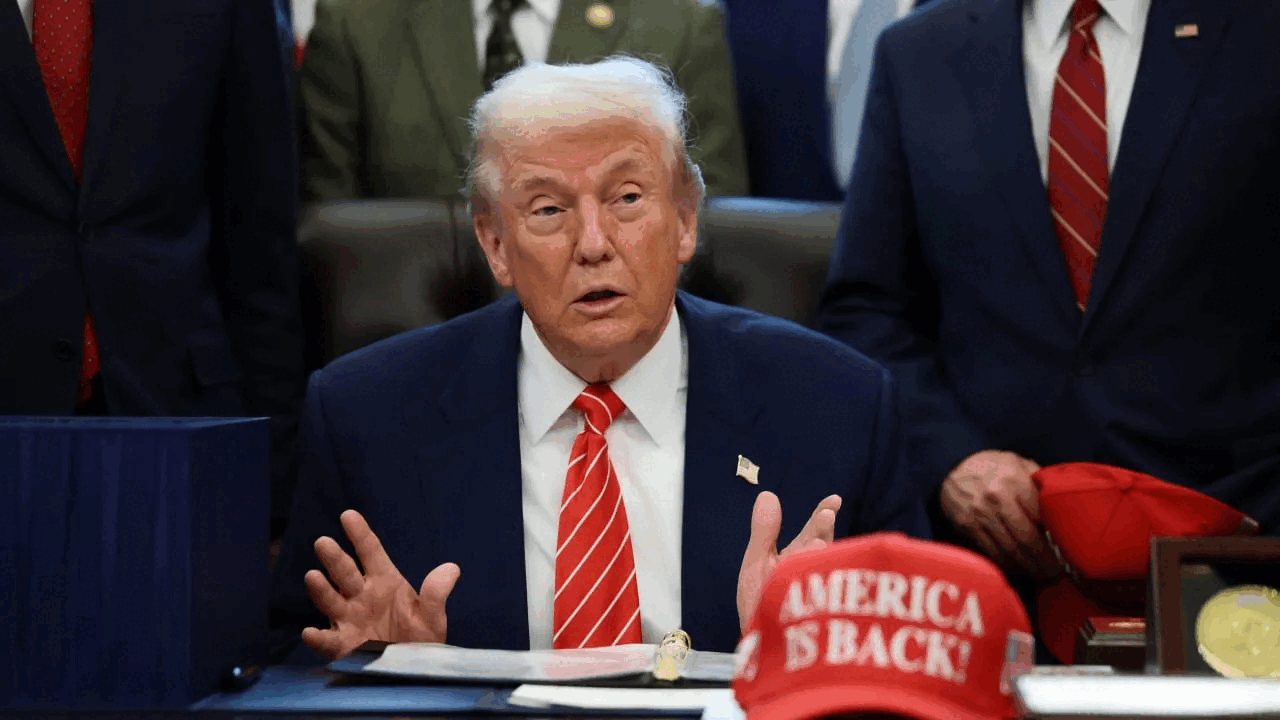 https://images.jpost.com/image/upload/f_auto,fl_lossy/q_auto/c_fill,g_faces:center,h_720,w_1280/704946
https://images.jpost.com/image/upload/f_auto,fl_lossy/q_auto/c_fill,g_faces:center,h_720,w_1280/704946"The Super Bowl Halftime Show is absolutely terrible, one of the worst, EVER! It makes no sense, is an affront to the Greatness of America, and doesn’t represent our standards of Success, Creativity, or Excellence. Nobody understands a word this guy is saying, and the dancing is disgusting, especially for young children that are watching from throughout the U.S.A., and all over the World," Trump wrote on Truth Social.
"This ‘Show’ is just a ‘slap in the face’ to our Country, which is setting new standards and records every single day — including the Best Stock Market and 401(k)s in History! There is nothing inspirational about this mess of a Halftime Show and watch, it will get great reviews from the Fake News Media, because they haven’t got a clue of what is going on in the REAL WORLD — And, by the way, the NFL should immediately replace its ridiculous new Kickoff Rule. MAKE AMERICA GREAT AGAIN!"
-
February 8, 2026
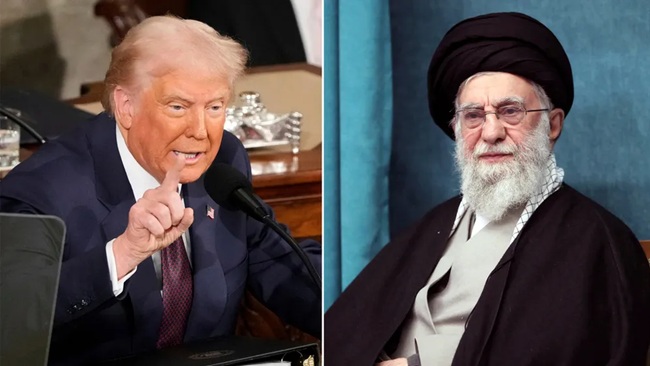 US President Donald Trump and Iranian Supreme Leader Ali Khamenei. (photos: Ben Curtis, AP; Office of the Iranian Supreme Leader via AP)
US President Donald Trump and Iranian Supreme Leader Ali Khamenei. (photos: Ben Curtis, AP; Office of the Iranian Supreme Leader via AP)The US administration has told Iran that it expects Foreign Minister Abbas Araghchi and the Iranian delegation to arrive at the next round of nuclear talks “with significant content,” two sources familiar with the matter told i24NEWS.
The initial meeting between the parties was described as a “good meeting,” but focused primarily on procedural issues rather than substantive negotiations.
Washington now anticipates that Tehran will present tangible concessions on its nuclear program and other pressing concerns during the upcoming discussions.
-
February 8, 2026
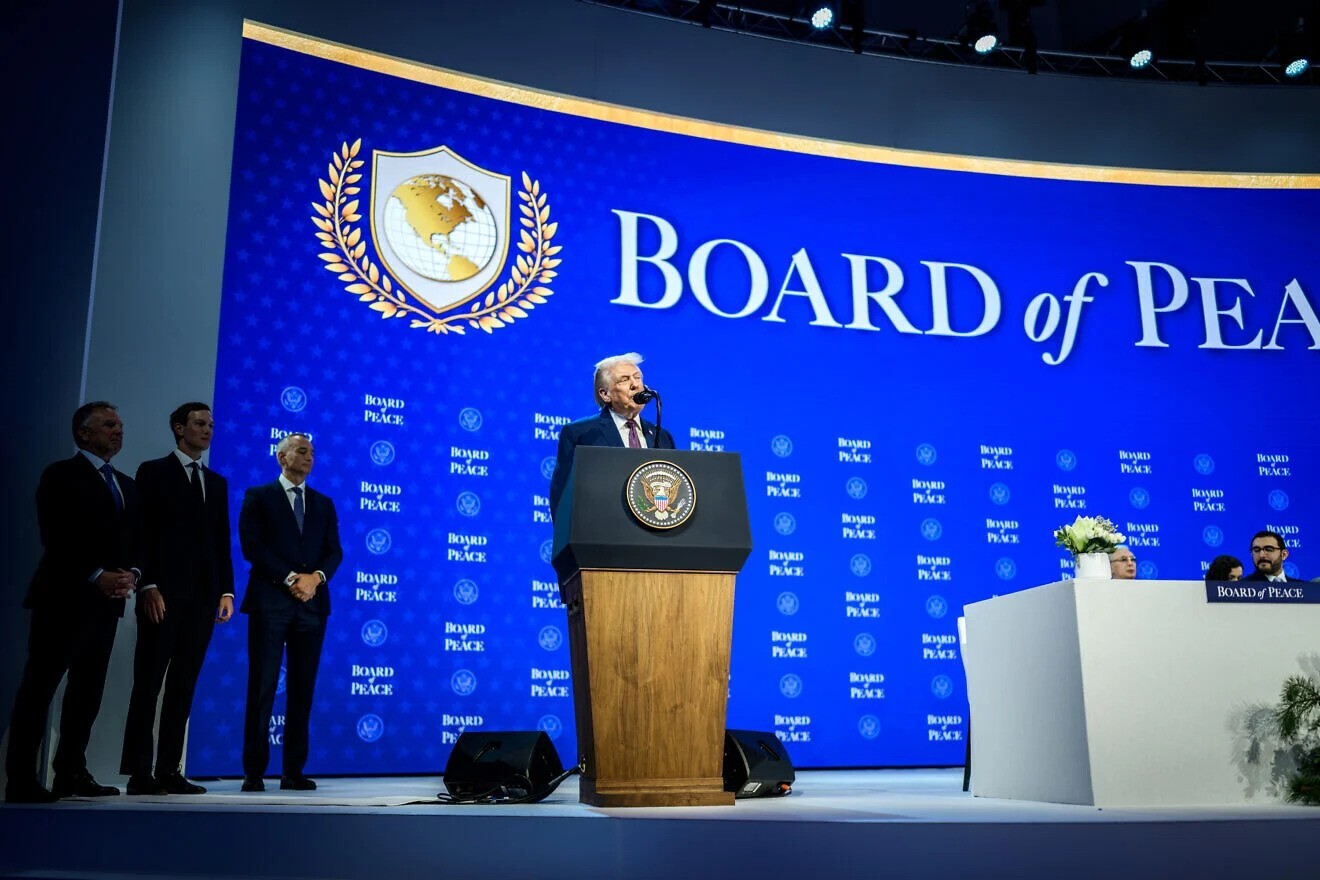 U.S. President Donald Trump participates in the Board of Peace charter announcement and signing ceremony during the World Economic Forum at the Davos Congress Center in Davos, Switzerland, Jan. 22, 2026. Photo by Daniel Torok/White House.
U.S. President Donald Trump participates in the Board of Peace charter announcement and signing ceremony during the World Economic Forum at the Davos Congress Center in Davos, Switzerland, Jan. 22, 2026. Photo by Daniel Torok/White House.The Trump administration plans to host leaders from the Board of Peace in Washington, D.C., on Feb. 19, Axios reported on Friday night.
“Nothing has been confirmed yet, but the administration is planning it and has started checking which leaders are able to attend,” said one source, who did not identify by name.
Israeli Prime Minister Benjamin Netanyahu, who accepted an invitation to join the board, is scheduled to meet with President Donald Trump in the U.S. capital on Feb. 18, according to the repor
Headline News
-
February 16, 2026
-
February 16, 2026
-
February 16, 2026
-
February 16, 2026
-
February 16, 2026
-
February 16, 2026
-
February 16, 2026
-
February 16, 2026
Israel News
-
February 16, 2026
-
February 16, 2026
-
February 16, 2026
-
February 16, 2026
-
February 16, 2026
-
February 16, 2026
-
February 16, 2026
White House News
-
February 16, 2026
-
February 16, 2026
-
February 16, 2026
-
February 16, 2026
-
February 16, 2026
-
February 16, 2026
-
February 16, 2026
Provocative Commentary
-
February 16, 2026
-
February 16, 2026
-
February 15, 2026
-
February 15, 2026
-
February 14, 2026
-
February 14, 2026
-
February 13, 2026
-
February 13, 2026
-
February 12, 2026
-
February 12, 2026
-
February 11, 2026
-
February 11, 2026
-
February 10, 2026
-
February 10, 2026
-
February 9, 2026

“The men who have done the most for God in this world have been early on their knees. He who fritters away the early morning, its opportunity and freshness, in other pursuits than seeking God will make poor headway seeking Him the rest of the day. If God is not first in our thoughts and efforts in the morning, He will be in the last place the remainder of the day.”
― E.M. Bounds

